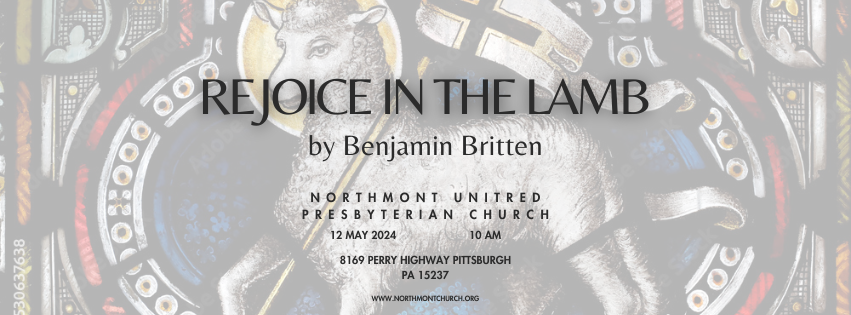
Worship on Sunday, May 12, will be a unique celebration of the Easter season enhanced by special music. Chancel Choir will sing the cantata, Rejoice in the Lamb, by 20th-century English composer, Benjamin Britten. The cantata is about 16 minutes in length. It is a joyful, solemn, playful, mystical celebration of praise to God and to the Lamb. It is scored for choir, soprano, alto, tenor, and bass soloists, and organ. It is sure to be an inspiring service that you will not want to miss. Plan to attend now and bring a friend or two.
About “Rejoice in the Lamb”
The words of the Cantata — “Rejoice in the Lamb” — are taken from the long poem of the same name. The writer was Christopher Smart, an eighteenth-century poet, deeply religious, but of a strange and unbalanced mind.
“Rejoice in the Lamb ” was written while Smart was in an asylum, and is chaotic in form but contains many flashes of genius.
It is a few of the finest passages that Benjamin Britten has chosen to set to music. The main theme of the poem, and that of the Cantata, is the worship of God, by all created beings and things, each in its own way.
The Cantata is made up of ten short sections. The first sets the theme. The second gives a few examples of one person after another being summoned from the pages of the Old Testament to join with some creature in praising and rejoicing in God. The third is a quiet and ecstatic Hallelujah. In the fourth section Smart takes his beloved cat as an example of nature praising God by being simply what the Creator intended it to be. The same thought is carried on in the fifth section with the illustration of the mouse. The sixth section speaks of the flowers — “the poetry of Christ.” In the seventh section Smart refers to his troubles and suffering, but even these are an occasion for praising God, for it is through Christ that he will find his deliverance. The eighth section gives four letters from an alphabet, leading to a full chorus in section nine, which speaks of musical instruments and music’s praise of God. The final section repeats the Hallelujah. —Walter Hussey
Rejoice in the Lamb
CHORUS
Rejoice in God, O ye Tongues; give the glory to the Lord, and the Lamb.
Nations, and languages, and every Creature in which is the breath of Life.
Let man and beast appear before him, and magnify his name together.
Let Nimrod, the mighty hunter, bind a Leopard to the altar and consecrate his spear to the Lord.
Let Ishmail dedicate a Tyger, and give praise for the liberty in which the Lord has let him at large.
Let Balaam appear with an Ass, and bless the Lord his people and his creatures for a reward eternal.
Let Daniel come forth with a Lion, and praise God with all his might through faith in Christ Jesus.
Let Ithamar minister with a Chamois, and bless the name of Him that cloatheth the naked.
Let Jakim with the Satyr bless God in the dance.
Let David bless with the Bear the beginning of victory to the Lord—to the Lord the perfection of excellence.
Hallelujah for the heart of God, and from the hand of the artist inimitable, and from the echo of the heavenly harp in sweetness magnifical and mighty.
SOPRANO SOLO
For I will consider my Cat Jeoffry.
For he is the servant of the Living God, duly and daily serving him.
For at the first glance of the glory of God in the East he worships in his way.
For this is done by wreathing his body seven times round with elegant quickness.
For he knows that God is his Saviour.
For God has bless’d him in the variety of his movements.
For there is nothing sweeter than his peace when at rest.
For I am possessed of a cat, surpassing in beauty, from whom I take occasion to bless Almighty God.
ALTO SOLO
For the Mouse is a creature of great personal valour.
For this is a true case—Cat takes female mouse—male mouse will not depart, but stands threat’ning and daring.
. . . If you will let her go, I will engage you, as prodigious a creature as you are.
For the Mouse is a creature of great personal valour.
For the Mouse is of an hospitable disposition.
TENOR SOLO
For the flowers are great blessings.
For the flowers have their angels, even the words of God’s creation.
For the flower glorifies God and the root parries the adversary.
For there is a language of flowers.
For the flowers are peculiarly the poetry of Christ.
CHORUS
For I am under the same accusation with my Savior—
For they said, he is besides himself.
For the officers of the peace are at variance with me, and the watchman smites me with his staff.
For the Silly fellow! Silly fellow! is against me, and belongeth neither to me nor to my family.
For I am in twelve HARDSHIPS, but he that was born of a virgin shall deliver me out of all.
BASS SOLO
For H is a spirit, and therefore he is God.
For K is king, and therefore he is God.
For L is love, and therefore he is God.
For M is musick, and therefore he is God.
CHORUS
For the instruments are by their rhimes,
For the Shawm rhimes are lawn fawn and the like.
For the harp rhimes are sing ring and the like.
For the cymbal rhimes are bell well and the like.
For the flute rhimes are tooth youth and the like.
For the Bassoon rhimes are pass class and the like.
For the dulcimer rhimes are grace place and the like.
For the Clarinet rhimes are clean seen and the like.
For the trumpet rhimes are sound bound and the like.
For the TRUMPET of God is a blessed intelligence and so
are all the instruments in HEAVEN.
For GOD the father Almighty plays upon the HARP of stupendous magnitude and melody.
For at that time malignity ceases and the devils themselves are at peace.
For this time is perceptible to man by a remarkable stillness and serenity of soul.
Hallelujah for the heart of God, and from the hand of the artist inimitable, and from the echo of the heavenly harp in sweetness magnifical and mighty.
—adapted from Jubilate Agno
by Christopher Smart (1758-1763)

